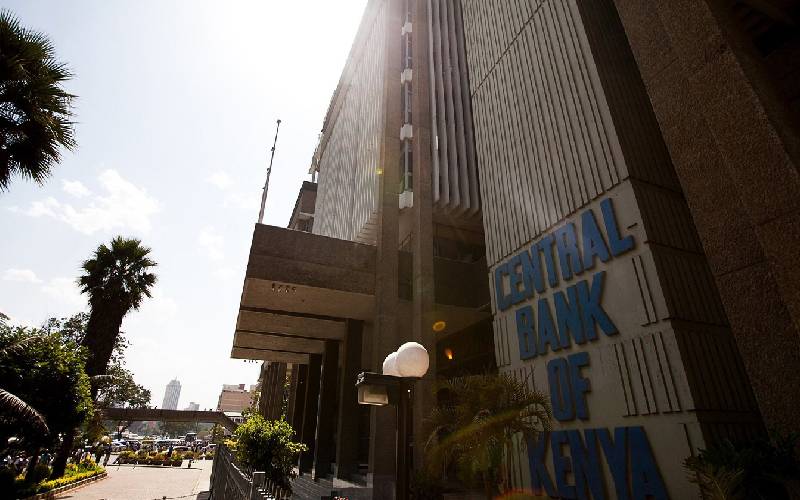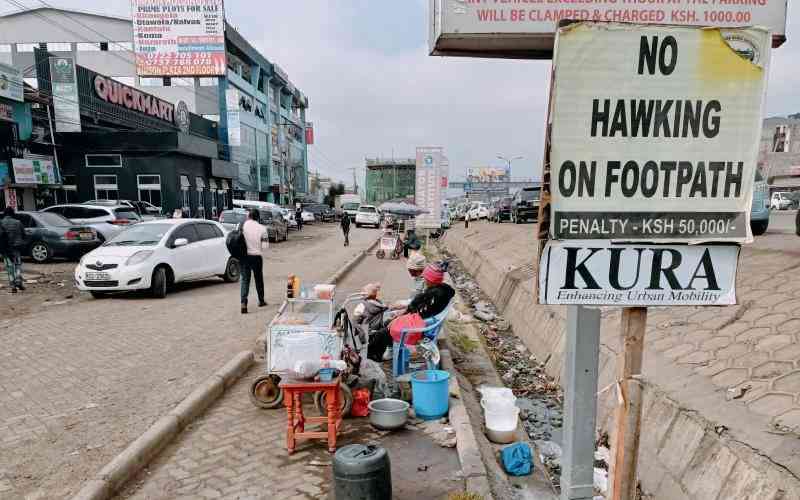
After a tumultuous 2017 in which the economy was gutted by a protracted electioneering period, a devastating drought and an agonisingly low credit extension to the private sector, most businesses looked up to 2018 with high expectations.
It was touted as the year of recovery. But with 2018 fast receding into the distance, the recovery proved elusive for a good number of Kenyan businesses.
Despite the celebrated handshake between President Uhuru Kenyatta and former Premier Raila Odinga that calmed political nerves, a low rate of inflation that contributed to a resurgent economy, some firms have balked under the weight of increased operating costs.
What would have been a good year has been desecrated by crippling policies - including punitive taxes and anti-business regulations.
As a result, 18 firms that had been profitable in 2017 plunged into losses, pushing up the number of loss-making firms in 2018 to 36 from 31 in 2017 according to an analysis of audited results for the over 100 listed and non-listed companies by Financial Standard.
Prominent firms that featured in this list of doom and gloom included the three subsidiaries of Britam Holdings Ltd, Sanlam Kenya, Flour miller Unga, Transnational Bank, Private equity fund Abraaj Group.
Other companies that saw their financial fortunes dissipate even as Government projected impressive growth due to increased investments in President Uhuru Kenyatta’s Big Four Agenda include Dyer & Blair Investment Bank, Old Mutual Securities, ABC Capital, and Eveready East Africa.
Only 12 companies, out of the 31 that made losses in 2017, cruised into profitability. For the remaining that were stuck in the loss-making hole, eight bled even more - stroking fears of job losses as firms such as Mumias Sugar, East African Portland Company (EAPC) and Kenya Airways teetered to a near collapse. Housing Finance Group, which was among the 16 firms that issued profit warnings, was forced to offload some of its workers to stay afloat, fueling the unemployment crisis.
In addition to the three, the plot also thickened for Stanlib Kenya Ltd and Kenya Women Microfinance Bank which sank deeper into the red.
For the Kenya Women Microfinance Bank and five other micro-lenders regulated by the Central Bank of Kenya, the ubiquitous mobile lending platforms and other financial technologies continued to hound them.
At least 30 companies saw their profits dip by an average of 27 per cent, in a year that saw 16 publicly listed firms issue profit alerts as they expected their returns at the end of the year to decline by at least 25 per cent.
Troubled lender National Bank - another firm that had issued profit warning - saw its profit decline by a staggering 98 per cent to Sh7 million, up from Sh400 million in the previous year as the lender struggled to recover its bad loans.
High energy costs and low cement consumption saw Bamburi Cement’s half-year profit to June 2018 tank by 78 per cent to Sh399 million - from Sh1.8 billion in the same period in 2017.
Fund managers Dry Associates saw their profits drop by 93 per cent - from Sh37 million to Sh2.4 million, in a year that saw stockbrokers and investment banks sink into a combined loss of Sh378 million following a bearish market.
Stay informed. Subscribe to our newsletter
Besides Bamburi, Mumias Sugar, Unga, Eveready and EAPC, Crown Paint is the other manufacturer whose financial performance might have given President Kenyatta some homework as he embarks on his ambitious plan to create jobs by nudging up the share of manufacturing to 15 per cent of the Gross Domestic Product (GDP).
The paint maker’s profits in 2018 dropped by 32 per cent to Sh40.7 million from Sh60.4 million in 2017. The manufacturer’s dwindling sales are eaten into by high power bills. Some companies including major glass manufacturer have even opted to ditch Kenya in protest of the high electricity bills.
Egypt and Ethiopia are the preferred destinations for most of the firms that exit the Kenyan market. Others that have left Kenya in protest of high electricity bills include Yana Tyres owned by manufacturer Sameer Africa Ltd, Cadbury Kenya, and battery manufacturer Eveready.
Yet, last year, Cabinet Secretary for National Treasury Henry Rotich had good news for the rickety manufacturing sector and the entire economy. The Government had promised to support the sector by cutting off-peak power to heavy industries by half, he said.
Jubilee Government would also expand infrastructure through the extension of the Standard Gauge Railway (SGR), build new roads and ports. This, according to Rotich, would help create more jobs for the youth and grow the economy.
“With these interventions, coupled with continuing political stability and favourable macroeconomic environment, the economy is expected to perform better in 2018,” said Rotich when unveiling during the launch of the 2018 Economic Survey Report.
“The on-going investments in infrastructure, improved business confidence, and strong private consumption are expected to support growth in 2018,” he added. Recently, in his State of Nation address, President Kenyatta was bullish about the economy’s growth prospects for 2018, adding low inflation and stable exchange rate created an inviting business environment.
The Government, said Kenyatta, had estimated the GDP to have grown by 6.1 per cent last year, up from 4.9 per cent in 2017. “This encouraging growth performance was supported by strong public and private sector investments as well as prudent macro-economic policies,” said Kenyatta.
He noted that the growth was largely driven by the wholesale and retail trade, real estate, information and communication, and tourism.
Yet the profitability by firms, even among the sectors he cited, was not as rosy. Uchumi and Nakumatt Supermarkets found themselves in a comatose, infecting other related businesses such as clothing line retailer Deacons Kenya which issued a profit warning citing poor performance by anchor tenants.
Agricultural cultivation company Kakuzi saw its profitability reduce by 18.6 per cent to Sh481.6 million from Sh591.6 million, as Kenyan tea continued to fetch poor prices in the global market. Total export income from Pakistan, Kenya’s largest tea market, declined by seven per cent, ending an impressive three-year run.
As a result, the low returns could not sustain Kapchorua Tea’s increased labour cost, leading it to issue a profit warning. Limuru Tea, another listed agricultural company, moved into profitability from loss. While underlying inefficiencies at the firm level - including corruption and other managerial problems continued to drag companies such as EAPC, Mumias Sugar and Kenya Airways into a financial mess, there were also structural issues that made it almost impossible for some of them to make a comeback.
Low consumption of cement, particularly as Government scaled down on its construction activities in a bid to bring down its debt levels coupled with high energy costs did not help cement manufacturers EAPC and Bamburi.
Consumption of cement increased to a peak of 6,707,230 tonnes in 2016 supported by major Government infrastructural projects such as the SGR.
However, because the mega infrastructural projects contributed to the increase in debt levels to unsustainable, the Government was forced into austerity with cement consumed in 2018 declining to 5,907,380 tonnes.
True, a number of firms, about 11, cut their losses; and another 49 saw their profits increase. Banks were the star players in this category of profit-growers, chalking up massive profits where other firms were struggling.
Some of the companies that registered a major jump in profits include Dubai Islamic Bank which saw their yields increase 12-fold to Sh52 million in the year ending 2018 from Sh4.2 million in the previous financial year.
Investment bank Kestrel Capital saw its net profit surge 12-fold to Sh44 million from Sh3.7 million, as the now insider trading scandal-hit firm benefited from decent brokerage commission and advisory fees.
Development Bank of Kenya also registered a significant leap in profitability raking in Sh115.8 million in profit after tax compared to Sh27.6 million in the previous financial year.
However, the hang-overs of 2017 withstanding, the performance was far from ideal. Nowhere was this performance as grim as in the capital markets, with all the Nairobi Securities Exchange (NSE) indices pointing North. Since January 2018, the NSE-20 Share index which is the benchmark index nose-dived by 22 per cent.
The NSE-25 Share index and All-Share index (NASI) fell by 11.1 per cent and 11.9 per cent respectively. A bearish market ate into the earnings for UAP Holdings, Britam Holdings, and Centum Investments.
With a bearish stock market in which several counters blinked red, close to 15 companies issued profit warnings.
Stockbrokers and investment banks had a tough time posting a combined loss of Sh378.4 million.
Johnson Nderi, a manager, Corporate Finance and Advisory at ABC Capital Ltd Kenya attributed the 2018 mess to what he described as “demand destruction” through “over-taxation” and “over-regulation.” The new tax measures and illiberal policies such as a 2016 legislation that put a ceiling on the interest rate that lenders charge on a loan, reckoned Nderi, seems to have curtailed consumption.
While most banks made it to the list of profitable firms in 2018, analysts reckon that most of the lenders are not making their money by extending credit to firms and households which would then spend the money or invest it thus stimulating the economy.
Diaspora transactions
Instead, most banks are making money by lending to Government and non-funded income. Last year, for example, banks pocketed at least Sh122 billion from Government.
This was an increase of 14 per cent from Sh107.1 billion that the lenders received in the previous year, according to an analysis by The Standard.
Equity Bank saw its diaspora transaction volumes grow by a whopping 196 per cent to Sh107 billion, raking in Sh751 million in commissions - an increase of 169 per cent from Sh279 million it earned in the same period in 2017.
As a result, the World Bank has renewed its attack against the interest controls calling for its repeal as it interfered with the full recovery of the economy.
“There is need to repeal interest rate caps and restore the potency of monetary policy, which is essential in responding to shocks emanating from changes to the business cycle and stabilising growth,” said the global lender in its latest Kenya Economic Update.
According to the World Bank, the private sector requires sufficient credit to support desired expansion in real output through investment.
A recent report by Central Bank of Kenya, Kenya National Bureau of Statistics and Financial Sector Deepening found that majority of Kenyans are worse off this year financially than they were three years ago.
The 2019 FinAccess Household Survey found that most Kenyans are increasingly having difficulties meeting their day-to-day needs.
 The Standard Group Plc is a
multi-media organization with investments in media platforms spanning newspaper
print operations, television, radio broadcasting, digital and online services. The
Standard Group is recognized as a leading multi-media house in Kenya with a key
influence in matters of national and international interest.
The Standard Group Plc is a
multi-media organization with investments in media platforms spanning newspaper
print operations, television, radio broadcasting, digital and online services. The
Standard Group is recognized as a leading multi-media house in Kenya with a key
influence in matters of national and international interest.
 The Standard Group Plc is a
multi-media organization with investments in media platforms spanning newspaper
print operations, television, radio broadcasting, digital and online services. The
Standard Group is recognized as a leading multi-media house in Kenya with a key
influence in matters of national and international interest.
The Standard Group Plc is a
multi-media organization with investments in media platforms spanning newspaper
print operations, television, radio broadcasting, digital and online services. The
Standard Group is recognized as a leading multi-media house in Kenya with a key
influence in matters of national and international interest.










